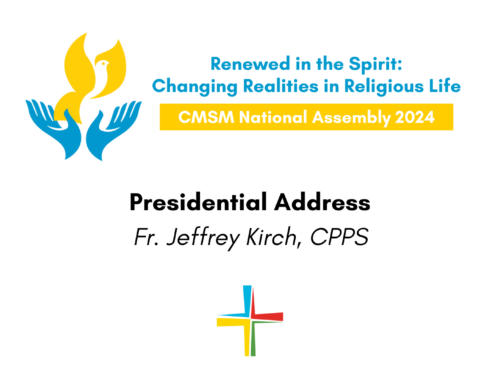In this essay, Fr. Aaron Wessman, GHM examines the impact of new artificial intelligence (AI) technology is having on religious life. He offers three suggestions for religious who are interested in engaging with this new technology and invites further conversation on the topic.
Click here to download a copy of the essay.
“How have you been using AI?”
I’ve asked this of fellow religious over the last few months. The answers vary.
Some chuckle and admit they’re doing nothing—then, with a guilty look, confess they think they should be doing more.
Others are skeptical, even defensive, alluding to AI’s potential negative moral implications.
And some glance around, ensuring no one else is listening, before confiding: “I’ve been using it for many things. It has changed my approach to ministry and life.”
I first heard of ChatGPT in late 2022 but approached it and other AI models like a timid academic—reading about it, tracking trends, pondering its moral implications—without really using it. That changed earlier this year when I taught a class that included a discussion of AI and evangelization. I took the plunge.
Now I can relate to what others have told me: AI has shifted my approach to ministry and life. If it hasn’t yet for you, I suspect it will.
So—how have you been using AI? And how should religious be using AI? I offer three considerations to begin this conversation. I hope this platform can be used for others to offer more.
- Read About AI
Engage a few thoughtful resources. The field is expanding daily, with literature ranging from technical overviews to sweeping moral reflections. Knowing where to begin can feel daunting.
Three resources I recommend:
- Co-Intelligence: Living and Working with AI by Ethan Mollick—balanced, practical, and short. He provides some helpful guidelines for AI usage. He also models—in the actual text of the book—some of the limits and possibilities of AI.
- Mastering AI: A Survival Guide to Our Superpowered Future by Jeremy Kahn—journalistic, accessible, and attentive to moral and political concerns, including AI’s environmental and military impact.
- Encountering Artificial Intelligence from the Vatican’s Dicastery for Culture and Education—free online, rich in theological and anthropological reflection.
Reading will spark ideas, but only experimentation will show you how AI can serve your ministry. This leads to my second recommendation.
- Explore How You Can Use AI
Sign up for a large language model AI (most offer free versions) and try it. Learn AI’s potential and limitations—which often can depend on the user’s interests.
For me, AI has become:
- A writing partner—offering endless feedback, explaining its suggestions, and acting like a patient editor. I still write and rework every piece myself, but AI boosts my confidence and sharpens my thinking. I’ve never had such a meticulous writing mentor—until now.
- A research assistant—curating magisterial documents, summarizing theology, and helping me navigate leadership topics from law to marketing to finance. Few religious have the financial resources for a team of professional assistants, unlike some established university professors or Fortune 500 executives. AI is leveling the playing field.
- A task manager—handling tedious jobs like drafting routine emails, letters, and travel plans, freeing me to focus on areas where my presence matters most, and allowing me to use my human assistants in ways the let their natural talents shine.
- A tutor—from touching up on my Spanish to studying complicated topics, AI’s capacity to be a personal tutor improves every day. And though there are the occasional AI “hallucinations”, i.e., incorrect or misleading responses given by the programs, these are becoming fewer as the technology improves.
In each instance, I remain the “human in the loop,” especially checking the information I have received. But AI has enhanced my ministry and personal life, without any immediate negative ramifications. In fact, for me, AI invites reflection on questions I have not yet discerned fully. This points to my final recommendation.
- Let AI Shake Up Your World
Using AI can be unsettling. When it gave a better answer than any student in years to one of my graduate course questions—in seconds—I had to ask: What does it mean to teach now? How will professors assess students? What will ministry look like in an AI world?
Some assume AI will never replicate fully empathy or the “human touch” of ministry. Nevertheless, relational AI is surprisingly capable of simulating understanding and empathy. The Church must discern what it alone can offer that AI cannot. Religious should also wrestle with helpful boundaries around AI interaction, and give voice to important ethical considerations.
This is not just a pastoral challenge—it’s a theological one. AI forces us to ask what it means to be human, and, by extension, who God is. It raises questions about creativity, humor, irony, and wisdom—realms once thought beyond machine reach. AI may never fully reach these, but the questions stemming from AI are right at our doors.
The Invitation
Whether we welcome it or not, AI is reshaping our world. Pope Leo recently reminded us of the “urgent need for serious reflection and ongoing discussion on…AI.”
For religious, this is not optional. Our communities must explore how AI intersects with our charism, ministry, and witness.
So, I return to my two questions: How have you been using AI? How should religious be using AI?
The future of ministry may depend on our answers.






